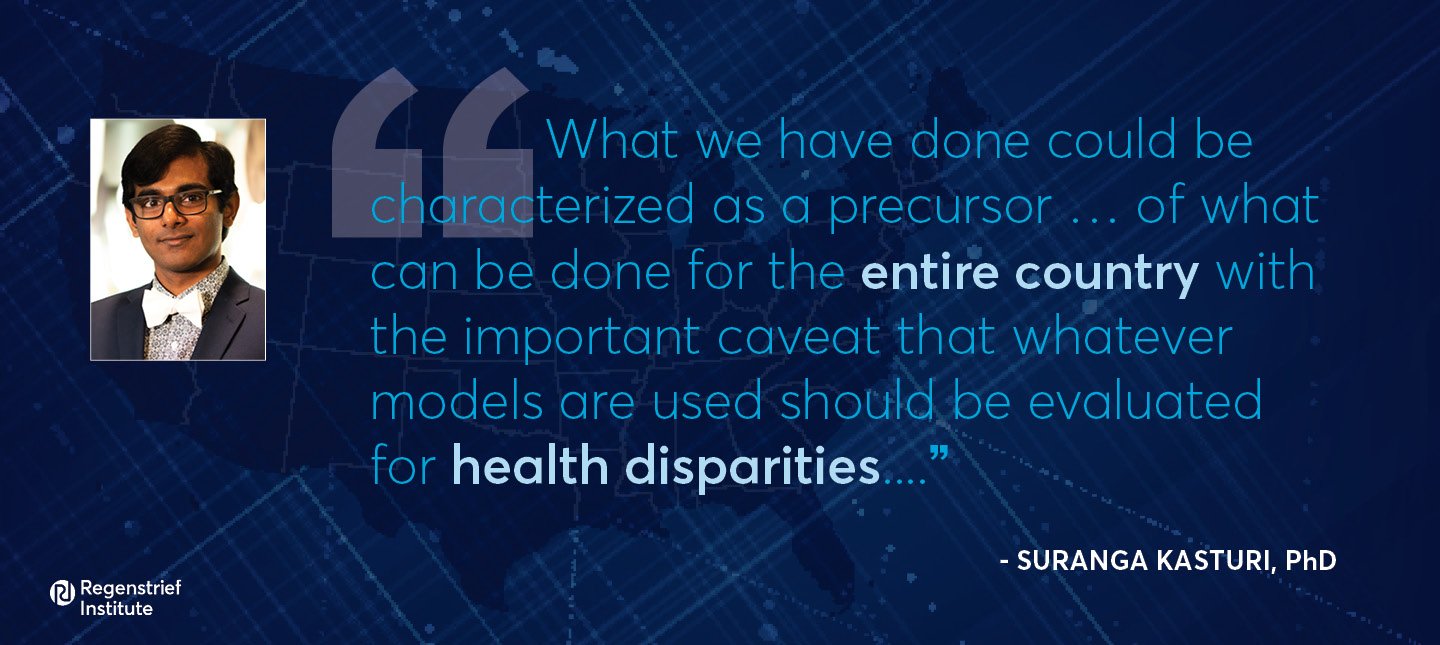Regenstrief study demonstrates how clinical data from healthcare systems can be used to better inform public health decision-making
The COVID-19 pandemic has highlighted both the necessity and the difficulty of using clinical data to inform state and national public health policymaking. In a new study, Regenstrief Institute and Indiana University researchers demonstrate that machine learning models trained using clinical data from a statewide health information exchange can predict, on a patient level, the likelihood of hospitalization of individuals with the virus.
“It has been quite challenging to bring the bread-and-butter data generated by healthcare systems together with public health decision-making – entities which have long been separate and distinct,” said study senior author Shaun Grannis, M.D., M.S., Regenstrief Institute vice president for data and analytics and professor of family medicine at Indiana University School of Medicine. “Our work shows how you can build and employ AI (artificial intelligence) models to securely utilize the clinical information in a health information exchange to support public health needs such as predicting hospital utilization within one week and within six weeks of onset of COVID infection.
“When new circumstances requiring rapid response arise, such as emergence of omicron or other new variants, once there are sufficient cases to train models, one can confidently access and plug clinical data into these readily available models to make accurate public health predictions and provide valuable insights into patient-level need for healthcare resource utilization,” said Dr. Grannis.
The researchers used clinical data from 96,026 individuals from all 957 zip codes in Indiana to train decision models that predicted healthcare resource utilization.
“Since the onset of COVID-19, researchers, healthcare systems, public health departments and others have leveraged existing data repositories and health information infrastructure for rapid analytics,” said study first author Suranga Kasturi, PhD, a Regenstrief Institute research scientist and an assistant professor of pediatrics at IU School of Medicine. “Machine learning has been invaluable in these efforts.”
“But any model is only as good as the data that goes into it,” he added. “The broad, robust data from the Indiana Network for Patient Care is representative of the U.S. population. What we have done could be characterized as a precursor of how AI tools can be deployed across the entire country with the important caveat that whatever models are used should be evaluated for fairness across all subpopulations.”
The Indiana Network for Patient Care (INPC), a regional health information exchange developed by Regenstrief Institute and managed by the Indiana Health Information Exchange (IHIE), is the nation’s largest inter-organizational clinical data repository and houses more than 14 billion pieces of patient data.
“Predicting COVID-19–Related Health Care Resource Utilization Across a Statewide Patient Population: Model Development Study” is published in the Journal of Medical Internet Research. Authors in addition to Drs. Grannis and Kasturi are Regenstrief Institute research scientists and IU School of Medicine faculty members Babar Khan, M.D., M.S., and David A. Haggstrom, M.D., MAS, and also Jeremy Park, B.S., and David Wild, PhD, both of the Luddy School of Informatics, Computing and Engineering at IU-Bloomington.
The study was supported by a Regenstrief Institute COVID-19 research pilot grant and by Indiana University.
About Regenstrief Institute
Founded in 1969 in Indianapolis, the Regenstrief Institute is a local, national and global leader dedicated to a world where better information empowers people to end disease and realize true health. A key research partner to Indiana University, Regenstrief and its research scientists are responsible for a growing number of major healthcare innovations and studies. Examples range from the development of global health information technology standards that enable the use and interoperability of electronic health records to improving patient-physician communications, to creating models of care that inform practice and improve the lives of patients around the globe.
Sam Regenstrief, a nationally successful entrepreneur from Connersville, Indiana, founded the institute with the goal of making healthcare more efficient and accessible for everyone. His vision continues to guide the institute’s research mission.
About IU School of Medicine
IU School of Medicine is the largest medical school in the U.S. and is annually ranked among the top medical schools in the nation by U.S. News & World Report. The school offers high-quality medical education, access to leading medical research and rich campus life in nine Indiana cities, including rural and urban locations consistently recognized for livability.
About Shaun Grannis, M.D., M.S.
In addition to his role as the vice president of data and analytics at Regenstrief Institute, Shaun Grannis, M.D., M.S., is the Regenstrief Chair in Medical Informatics and a professor of family medicine at Indiana University School of Medicine.
About Suranga Kasturi, PhD
In addition to being a research scientist at Regenstrief Institute, Suranga Kasturi, PhD, is an assistant professor in the Department of Pediatrics at Indiana University School of Medicine.
About Babar Khan, M.D., M.S.
Babar Kahn, M.D., M.S., is associate director of the IU Center for Aging Research at Regenstrief Institute. He also serves as an associate professor of medicine and the Floyd and Reba Smith Investigator in Respiratory Disease in the Division of Pulmonary Medicine at Indiana University School of Medicine.
About David A. Haggstrom, M.D., MAS
In addition to his role as director of the Regenstrief Institute Center for Health Services Research, David A. Haggstrom, M.D., MAS, is a core investigator for the U.S. Department of Veterans Affairs Health Services Research and Development Center for Health Information and Communication, Richard L. Roudebush VA Medical Center. He is also an associate professor of medicine and the Sam Regenstrief Investigator in Health Services Research at Indiana University School of Medicine and a member of the IU Melvin and Bren Simon Comprehensive Cancer Center.










